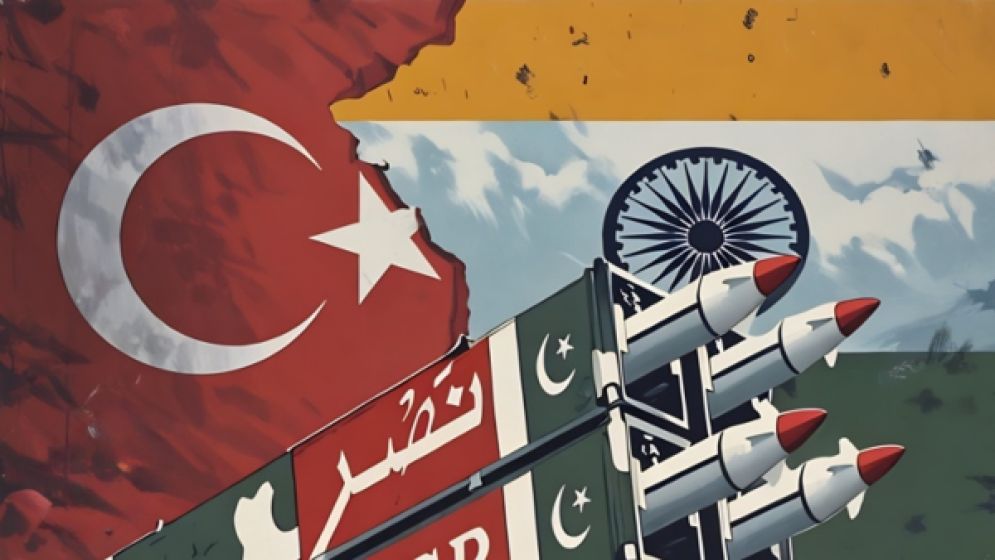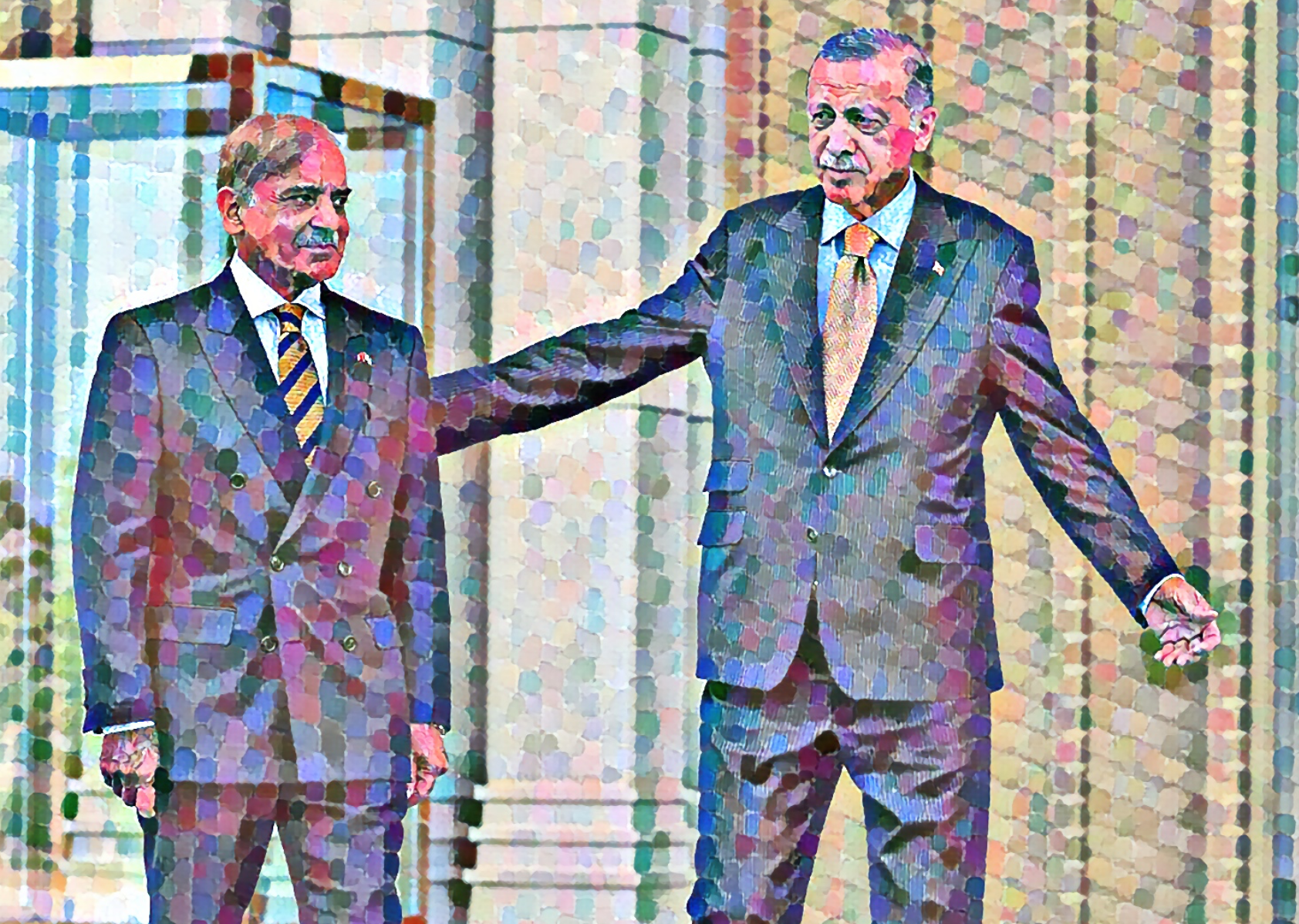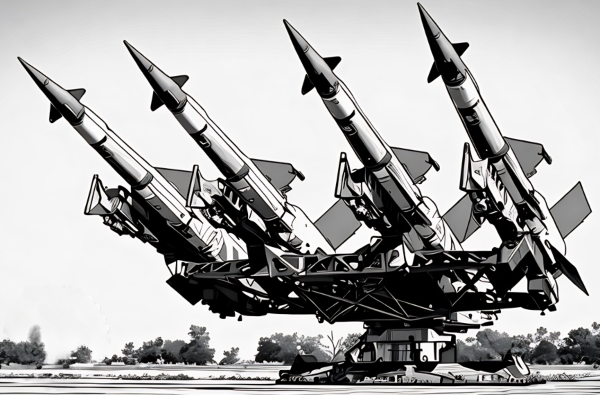Erdogan's bet on Pakistan comes at India's expense..but what’s next?

Over the past several weeks, as Pakistan and India edged dangerously close to a broader war, another story unfolded beneath the smoke and fury: the deepening and potentially destabilizing partnership between Islamabad and Ankara.
Turkey, a NATO member with global ambitions and a growing
appetite for defense exports, has once again cast its lot with Pakistan both diplomatically and militarily.
That decision, while unsurprising to seasoned regional analysts, represents a calculated gamble by Turkish President Recep Tayyip Erdogan. One that threatens to fray Ankara's already brittle ties with India, and further entrench a geopolitical bloc increasingly defined by anti-Delhi posturing.
As cross-border clashes erupted between May 6 and May 10, culminating in a fragile ceasefire, Turkey stood virtually alone in offering Islamabad more than words.
Erdogan praised Pakistan’s “sensible, patient policy,” a narrative that barely conceals the reality of Pakistan launching hundreds of drones–many of them Turkish-made–into Indian territory.
The Turkish Songar drones, produced by Asisguard, were reportedly central to Pakistan’s May 9–10 operations that targeted over 30 Indian military sites.
Let’s be clear: this was not mere rhetorical solidarity. This was an operational alliance.
To regional observers in Dhaka and beyond, the implications are as troubling as they are clear. With China already firmly tethered to Pakistan’s strategic ambitions, Ankara’s increasing willingness to wade into South Asian fault lines adds a combustible third axis.
Erdogan’s embrace of Pakistan as a kindred ideological and geopolitical partner—one increasingly reliant on Turkish arms–marks a notable shift in Turkey’s global calculus.
India, for its part, has remained officially restrained, but behind closed doors, the message in New Delhi is unmistakable.
Erdogan’s overt backing of Islamabad during a week of high-stakes escalation–especially amid Turkish drones being used in active combat–has been received not as neutrality, but as provocation.

Pakistan’s new bromance
Pakistan’s Prime Minister Shehbaz Sharif, sensing the optics, has leaned into the bromance. He praised Erdogan as his “dear brother” and hailed Turkey’s “unwavering solidarity.”
That language is strategic signaling to allies and adversaries alike: Pakistan is not alone–and it has partners willing to arm and support it when the missiles fly.
But what’s less talked about is the long game. Turkey’s defense sector is expanding aggressively, and Pakistan is becoming a prized client.
Yet in playing this game of power politics, Erdogan risks alienating India, one of the world’s largest defense markets and a key regional player whose cooperation Turkey can ill afford to lose in the long term.
This is a glimpse into the emerging multipolar disorder, where old alliances are transactional, new ones are tactical, and conflict serves as the proving ground for partnership.
South Asia can scarcely afford another flare-up. But if Ankara continues down this path–arming one side, affirming its worldview, and embedding itself in regional rivalries–then when the next conflict comes, the costs won’t stop at the Line of Control.
They may echo all the way to Ankara.
This is because Turkey’s defense entanglement with Pakistan is hardwired into strategy, production, and the battlefield. And the stakes are only rising.
As Pakistani drones swarmed Indian defense installations earlier this month, evidence emerged that not only were Turkish-manufactured Songar drones deployed, but so too was the YIHA-3–a new kamikaze drone co-developed by Turkish defense giant Baykar and Pakistan’s National Aerospace Technology Park.
If the conflict had escalated further, analysts say we may have seen Turkish-made TB2 and Akinci drones–veterans of wars in Libya, Syria, and Nagorno-Karabakh–taking active strike roles against Indian ground forces.
Pakistan, it seems, trusts Turkish firepower enough to bet its wartime operations on it.
“[This] demonstrates Pakistan's confidence in Turkish technology, while reinforcing Turkey's emergence as a reliable defense partner outside NATO frameworks,” said Gloria Shkurti Ozdemir of Ankara's pro-government SETA Foundation.
In other words: Turkey is carving out a parallel defense diplomacy, independent of Western approval–and Pakistan is its testbed.
But drones are just the tip of the iceberg.

A new dynamics in global arms race
Turkey is now the third-largest arms supplier to Pakistan, after China and the Netherlands, according to the Stockholm International Peace Research Institute.
A multi-billion-dollar MILGEM deal involving the co-construction of four corvette warships–two in Turkey, two in Karachi–has turned the bilateral relationship into one of joint production and technology transfer.
Turkish and Pakistani engineers are also working together to upgrade Islamabad’s F-16 fleet and its French-origin Agosta 90B submarines. These are essentially long-term entanglements.
The symbolism of it all has not gone unnoticed in New Delhi.
Anger is growing across India among policy elites as well as within the broader nationalist ecosystem. The Rashtriya Swayamsevak Sangh (RSS), the ideological engine behind Prime Minister Narendra Modi’s Bharatiya Janata Party, has already called for economic sanctions on Ankara.
Social media is awash with calls to boycott Turkish goods. Indian travel firms are reporting mass cancellations of holidays to Turkey and Azerbaijan–another vocal backer of Pakistan during the May skirmishes.
And while India has not yet retaliated diplomatically, the silence should not be mistaken for indifference. A reckoning is coming.
For Turkey, this is a calculated risk. Erdogan has long sought to position himself as a leader of the Muslim world, often at the expense of delicate geopolitical balances.
His repeated endorsements of Pakistan during the Kashmir crisis, his criticism of India’s domestic policies, and now the flow of lethal hardware during live conflict all point to a new axis–one grounded not only in shared religion but mutual militarization.
As a regional analyst watching from Dhaka, the implications are deeply unsettling. Bangladesh, like many countries in the Global South, seeks a South Asia where economic integration trumps ideological alignment and where conflict doesn’t become a marketplace for foreign hardware.
But with Turkey now openly backing Pakistan militarily, that fragile hope seems to be slipping.

The fractured future
Unlike China, which balances transactional defense exports with economic engagement across the subcontinent, Turkey has little incentive to hedge.
“Owing to ideological and political alignment, limited trade with India, a smaller inflow of Indian tourists, and fierce competition within the Indian defense market,” noted Umer Karim of the University of Birmingham in his blog, “Turkey is fine to put all its eggs in Pakistan’s basket.”
Translation: for Ankara, India is too difficult, too crowded, and too independent. Pakistan, in contrast, is a willing customer, a political partner, and an ideological ally.
But this is not a one-way affair. Pakistan has reciprocated loyally, backing Turkey on some of its most sensitive international issues–Cyprus, Armenia, and increasingly, its muscular foreign policy posture in the Mediterranean.
“Islamabad has shown consistent support for Ankara on flashpoint issues,” Islamabad-based analyst Umair Pervez Khan told Nikkei Asia, “and Turkey, in turn, has every political reason to stand shoulder-to-shoulder with Pakistan.”
Geopolitics, of course, is the glue holding this alliance together. For Turkey, South Asia is not an end in itself–it’s a springboard. As Ankara seeks to extend its reach into the Indo-Pacific, Pakistan offers a strategic launchpad.
“Pakistan serves as a dependable ally with regard to Turkey’s Indo-Pacific ambitions, both in politics and trade–especially in engaging Indonesia and Malaysia,” said Karim.
This isn’t just about proximity or ideology anymore–it’s about projection. As Gloria Shkurti Ozdemir of Ankara’s SETA Foundation put it: “The close relationship with Pakistan offers Turkey a valuable partner in South Asia and a potential gateway to broader engagement in Indian Ocean affairs.”
From Dhaka, this shift is deeply instructive–and more than a little troubling.
Bangladesh, a nation striving to remain equidistant from the region’s growing polarities, now finds itself observing an increasingly militarized alignment just west of its borders.
Ankara’s gamble may deepen strategic fault lines in South Asia, turn regional disputes into ideological battlegrounds, and nudge a volatile subcontinent into deeper confrontation.
India, for its part, is unlikely to forgive or forget this pivot. A country that once considered Turkey a distant but manageable diplomatic partner now sees it as an active enabler of its principal adversary.
Ankara may believe it is securing a strategic foothold. But in aligning so closely–and so brazenly–with a state that routinely tests regional stability, it may be burning more bridges than it builds.
For Erdogan, the allure of Pakistan as a loyal client and ideological twin is obvious. But the blowback from India–economic, diplomatic, and potentially strategic–has only just begun.
—
Md Sazzad Amin is an entrepreneur and an armchair political analyst

